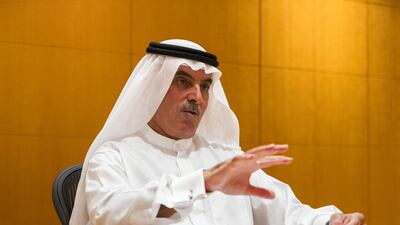Banks in the UAE do not need more stimulus from the central bank to deal with the coronavirus impact, although the government has many tools at its disposal to support the economy if needed.
“The good news is [that] today we do not need more ... what we have [right now] is good,” Abdulaziz Al Ghurair, chairman of the UAE Banks Federation, said. “If things improve, we will return this money and if things deteriorate and the world goes into [a] 10 per cent [economic] shrinkage, there will be a different decision at that time.”
The Central Bank of the UAE on March 14 rolled out a Dh100 billion ($27bn) stimulus to mitigate the impact of the coronavirus on the country’s economy. The package was boosted to Dh256bn on April 5 when the banking regulator halved banks' capital buffer requirements to 7 per cent. The central bank also extended the duration of the Targeted Economic Support Scheme (Tess) for affected retail and corporate customers, allowing banks and finance companies to defer the principal amount of loans and interest until the end of this year.
The aggregate value of all capital and liquidity measures now include Dh50bn in capital buffer relief, Dh50bn in zero-cost funding support, Dh95bn in liquidity buffer relief and a Dh61bn reduction in cash reserve requirements. On the fiscal side, the UAE government has also launched several initiatives worth Dh26bn to reduce the cost of living and support smaller businesses.
Of the Dh256bn central bank initiative, Dh205bn is liquidity made available to the banks for lending, Mr Al Ghurair, who is also chairman of Dubai’s Mashreq bank, said. The remainder is a relief package for individual borrowers and companies in sectors affected by the coronavirus.
“The relief [package] is supposed to be used exclusively for commercial companies and individuals and not to be used to fund GREs [government-related entities] or government institutions,” he noted.
Total lending in the UAE currently stands at about Dh1.6 trillion, out of which Dh1tn is loaned to individuals and commercial entities. The Dh205bn in available liquidity is enough for the banks to maintain their average annual loan growth over the last five years for the next four, he added.
Government and central banks around the world have rolled out monetary and fiscal initiatives to soften the impact of the coronavirus outbreak on businesses. The virus has infected more than 1.7 million people globally and killed close to 110,000, according to Johns Hopkins University, which is tracking the outbreak. More than 409,000 people have recovered from the disease.
Rate cuts, dedicated liquidity lines, wage protection schemes, loan guarantees and direct aid to households are among the measures that have already been implemented in a number of countries.
The UAE, Mr Al Ghurair said, has several such tools to support the economy. Lowering tariffs and fees, an SME loan guarantee programme, employee salary guarantees or even the federal government buying back government loans are some of the options.
“Today we have enough liquidity to look after our [lending] requirements and to support our economy to ensure it comes out of this challenge,” he noted.
On the debt crisis facing the embattled UAE healthcare firm NMC Health, Mr Al Ghurair said the decision to put the company under administration is a protective move. It ensures that “there’s no playing around with whatever money is there” and also to protect the records.
A UK court placed Abu Dhabi-based NMC Health into administration last week on the request Abu Dhabi Commercial Bank, its biggest lender, which has an exposure of $981 million (Dh3.6bn) to the healthcare company. The size of its lending increases to $1.16bn when factoring in Finablr, another company owned by NMC Health's founder BR Shetty, which is not in administration. Overall, UAE banks have a combined exposure of at least Dh8bn to NMC Health.
It is in interest of banks to keep NMC business going “as long as possible” to recover their money, he added.
“If you present their balance sheet today, people will still lend them. Banks do not plan for fraud … this is a world-class fraud,” Mr Al Ghurair said. “I think the management and the board members [of NMC] should be held accountable.”


